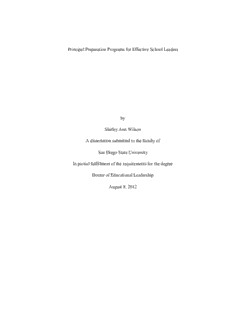Table Of ContentPrincipal Preparation Programs for Effective School Leaders
by
Shirley Ann Wilson
A dissertation submitted to the faculty of
San Diego State University
In partial fulfillment of the requirements for the degree
Doctor of Educational Leadership
August 8, 2012
iii
Copyright © 2012
by
Shirley Ann Wilson
iv
ABSTRACT
Effective school leaders foster improved student learning and higher academic
achievement. Many critics of university-based principal preparation programs fault
universities for failing to improve efforts to prepare candidates to address the complex
issues facing principals in today’s high stakes accountability environment. Each principal
faces local, state, and federal pressure to influence continuous improvement in
achievement results for every demographic group of students.
The challenge facing school districts is not the shortage of school administrators,
but the shortage of qualified principal candidates who have the ability to collaborate with
stakeholders, and the skill to develop an instructional program that ensures all students
are learning and achieving at a high level.
To support the development of school leaders to lead schools in the 21st century,
school districts and universities are joining forces. This qualitative case study examined
the Aspiring Administrators Program, a principal preparation partnership program
between the San Diego Unified School District (SDUSD) and San Diego State University
(SDSU). The researcher conducted and analyzed course documents to better understand
the nature of the program. Also, the researcher conducted and analyzed individual and
focus group interviews to ascertain the perceptions of the program’s first cohort of
participants, principal coaches, district personnel, and university faculty. This study
particularly examined the goals of the program and the various program features intended
to help achieve the goals. As well, the study explored the nature of the district/university
collaboration that facilitated the program’s design. Finally, the study examined
preliminary evidence that indicated the extent to which the program’s candidates were
v
acquiring the necessary skills, knowledge, and dispositions necessary for effective school
leadership.
The results suggest that the Aspiring Administrators Program shows promise
increasing the extent to which aspiring administrators obtain the skills, knowledge, and
dispositions needed to improve school-wide achievement, resulting in the closing of
achievement gaps.
vi
TABLE OF CONTENTS
PAGE
ABSTRACT ....................................................... iv
LIST OF TABLES.................................................... xi
LIST OF FIGURES. .................................................. xii
ACKNOWLEDGMENTS.............................................. xiii
CHAPTER 1—INTRODUCTION. ...................................... 1
Statement of the Problem............................................ 4
Purpose of the Study. .............................................. 11
Research Questions. ............................................... 12
Relevant Research and Scholarship.................................... 12
Methodology. .................................................... 20
Limitations of the Study............................................. 23
Significance of the Research to Theory, Practice, and Policy. ............... 24
Definition of Terms. ............................................... 25
CHAPTER 2—LITERATURE REVIEW.................................. 28
Introduction. ..................................................... 28
Historical Perspective and the Movement Toward Standards................ 29
Accreditation for Educational Administration............................ 40
Quantitative and Qualitative Studies of Effective Schools for
Improved Achievement. ............................................ 43
Programs for Preparing School Leaders. ............................... 48
Call to Reform.................................................... 51
vii
Academies. ................................................... 52
New Education School Programs. ................................. 52
District and University Partnerships. ............................... 53
District-Based Programs. ........................................ 58
Nontraditional Providers. ........................................... 58
Nonprofit Providers............................................. 58
For-Profit Providers............................................. 59
Need for This Study................................................ 60
CHAPTER 3—RESEARCH DESIGN AND METHODOLOGY. .............. 63
Introduction. ..................................................... 63
Research Design................................................... 64
Research Questions. ............................................... 65
Role of the Researcher.............................................. 65
Participant Selection Procedures. ..................................... 66
Data Collection. .................................................. 67
Confidentiality and Ethical Issues. .................................... 69
Limitations....................................................... 70
CHAPTER 4—RESEARCH FINDINGS. ................................. 72
Data Collection and Analysis......................................... 72
Background. ..................................................... 74
Memorandum of Understanding. ..................................... 76
Other Local Educational Leadership Programs........................... 77
Research Question 1. .............................................. 82
viii
Spirit of Collaboration........................................... 82
Relevance to District Needs....................................... 85
Effective Communication. ....................................... 87
Research Question 2. .............................................. 90
Knowledge, Skills, and Dispositions Related to CPSEL Standards. ....... 90
Development of a Shared Vision................................... 93
Culture and Diversity............................................ 94
Data Use to Improve Instruction and Close Achievement Gaps. .......... 96
School Management and Work With Stakeholders..................... 98
Research Question 3. .............................................. 100
Candidate Selection............................................. 100
University Curriculum........................................... 105
The Improvement Plan........................................... 110
District-Based Professional Development............................ 112
Data Management Program....................................... 113
Professional Living Communities. ................................. 114
Balanced Leadership and Change. ................................. 115
Response-to-Intervention......................................... 116
Instructional Leader............................................. 116
Distributed Leadership........................................... 117
Cohort. ...................................................... 118
Principal Coaches............................................... 120
Evaluation Process.............................................. 123
ix
Research Question 4. .............................................. 128
Summary of Research Findings....................................... 133
CHAPTER 5—SUMMARY, CONCLUSION, AND
RECOMMENDATIONS............................................... 136
Overview of the Problem............................................ 136
Methodology. .................................................... 138
Findings and the Research Literature................................... 139
Limitations of the Study............................................. 144
Recommendations for Future Research................................. 145
Implications for Leadership Preparation Programs. ....................... 146
Conclusions. ..................................................... 147
REFERENCES. ..................................................... 149
APPENDICES
A. Questions for Coordinator. ....................................... 160
B. Questions for Faculty............................................ 161
C. Questions for Focus Group. ...................................... 163
D. Questions for Principal Coaches. .................................. 164
E. Informed Consent Letter: Principal Coaches.......................... 165
F. Informed Consent Letter: Program Coordinators. ..................... 167
G. Informed Consent Letter: Program Participants. ...................... 169
H. Informed Consent Letter: University Faculty. ........................ 171
I. San Diego Unified School District Research Proposal Review Letter. ..... 173
J. Aspiring Administrators Program Brochure. ......................... 174
x
K. Aspiring Administrators Program Nomination Email................... 176
L. Principal Coach Recruitment...................................... 177
Description:Effective school leaders foster improved student learning and higher .. boosts student learning is effective principal leadership (S. Davis, achievement gaps in the areas of mathematics and English Language Arts (USDOE, .. knowledge, skills, strategies, and tools leaders need to impact student

